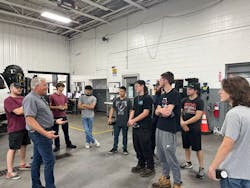School’s in: How to make meaningful tech recruitment partnerships
Every shop, fleet, and dealership faces different circumstances and challenges that impact hiring technicians. In the case of Laramie GM Auto Center in Wyoming, it was geography.
“We’re in the middle of nowhere,” explained Joe Hedley, general manager for Laramie GM. The altitude is 7,200 feet, and winters hit harder and for longer than most other places, he added, making the beautifully rugged region not for everyone.
“We really struggle with trying to keep people here,” Hedley sighed.
The dealership, which offers new Buick, Chevy, and GMC vehicles along with a robust inventory of used cars and trucks, still has to try, though. And while the population density is as thin as the air, the location has one major advantage: its proximity to WyoTech, an automotive, diesel, and collision trade school. You can drive there in about 10 minutes from the dealership.
More than 800 students graduated from WyoTech in 2023, and for years, Laramie GM has attended the school’s job fairs and worked closely with the school in general. Hedley said this has helped them schedule interviews with students whose goals align with the shop’s. This has led to the shop hiring a couple of kids from every career fair for part-time work, he explained, where they usually begin with quick lube work before progressing into the shop’s internal apprenticeship program.
“It helps to have [WyoTech] do some of the legwork,” he said. “And then we can jump in and really focus on the culture piece.”
Not every shop will have a large technical school on their doorstep, but more and more fleets and third-party repairers are leveraging nearby educational institutions to refresh and scale their workforce as current technicians turn over or retire. But this takes time and resources from maintenance leadership, and with both in limited supply, partnering with schools to maybe find some techs someday seems like a luxury few can afford.
But how much time and effort does it take to constantly onboard new technicians, and how much productivity are short-staffed shops losing out on? According to several fleets, working with schools to recruit techs is a worthwhile investment, but fleets need to be intentional in developing partnerships with schools and internship programs and only spend their time where it’s most likely to pay off.
The payoff
Before looking into a partnership, it’s important to understand that its main benefit is to install a continuous flow of possible new hires who could stay with the company for many years.
“I believe that shops and fleets need to identify talented students early—and that’s something that they really fall short on because they’re busy—and potentially recruit them as interns or employees,” said Cindy Barlow, director of industry outreach at WyoTech. “This whole system would streamline the recruitment process.”
In theory, shops and technical programs partnering on technician education creates well-rounded students, with schools providing theoretical base knowledge, while shops offer practical, real-world experience, Barlow noted. Together, this should result in students who are prepared for workplace scenarios. And it’s well worth putting in the outreach work early because if you don’t, others will.
“What you’re finding is that if [students] are going the two-year route, a lot of times you are fighting the other trades, such as electricians, plumbers, and other trades that use their hands,” noted Jay Goninen, co-founder and president of WrenchWay. The organization works to promote technical trades and match technicians with shops and shops with vocational schools.
Ashley Sowell, CEO and co-founder of Integrity Fleet Services, agreed, stating that she hopes to start a nonprofit that will lead to its own internship program and promote awareness for the trades as early elementary school. This is because by the time students reach middle school, they’re already looking at career paths, she said.
School partnership cheat sheet
- Set goals for your partnership and find schools that align with those goals.
- Decide what skills your techs need and provide guidance and tools to help schools teach.
- Consider outreach to high schools and even middle schools for broader awareness and reach.
- Focus on schools in your local area.
- Give your interns reason to stay with a structured program and equitable pay or a tool investment.
Another example is the FutureForward program in Adams County, Colorado. The program offers career and technical education for high schoolers. As part of the program, Ellen Gutierrez teaches diesel technology in a modern building that first opened in 2020. Her students hone their skills on an International semi-truck, fire trucks from the school’s firefighting program, and light-duty and pickup trucks, along with a recently donated aftertreatment system and 6.7L engine for midsized vehicles. To her knowledge, Iron Buffalo Truck & Trailer hired 10 of the program’s students after their internship, and LL Johnson hired their two interns as well.
Rush Enterprises has also benefited from its internship program. The company admits both high school students and those from dedicated technical schools like UTI and Lincoln Tech, explained Mitch Davisson, director of service, Rush Enterprises. Since the program began in March 2022, Rush hired 125 participants, and the program has a 68% retention rate.
High schools vs. vocational schools
While Rush Enterprises engages with both high schools and technical schools, smaller shops and fleets might not have that luxury for their partnerships. So, where should they focus their efforts? For students and shops, interns from either educational path have potential drawbacks and benefits.
For Gutierrez, the FutureForward program offers students a cheaper path to a career than a technical school, as well as all the basic knowledge needed before their on-the-job training.
“If they want that education or that associate’s degree, that’s great for them,” Gutierrez explained. “But it’s absolutely not what everybody goes for. And after completing two years of [FutureForeward’s program], they have a really good understanding going into the workforce.”
Read more: Colorado vocational school tailors curriculum to future fleet needs
Moreover, younger people’s abilities are easier to tailor depending on your needs, especially with access to OEM-specific training, said Warren Stephens, lead instructor of the auto and diesel technology division at Dubiski Career High School.
But some high schools may be limited in the training they can provide. Laramie High School does offer auto technology courses, but Hedley reported that it’s ideal to have students with more background knowledge.
“They’re not doing engine swaps and transmission swaps,” Hedley noted. “It’s really more basic, ground-level stuff. We want a little bit more training.”
The same critiques have been leveled at vocational schools as well, with Victor Cummings, VP of service operations at Rush Enterprises, stating that “a number of students who come out of these trade schools have never changed oil on a truck. When somebody comes out of school and they’ve done engine rebuilds on a stand, but they’ve never changed oil on an engine in a chassis, it’s kind of an awkward set of circumstances.”
Because of this, Goninen and Barlow both agreed that shops are better off partnering with a mix of secondary and post-secondary schools when they can. “There isn’t necessarily a ‘better’ institution to partner with,” Barlow said. “When it comes to building the educational pipeline, it largely depends on the specific goals and the needs of the organization or industry involved.”
Matching with a school
When choosing a school to partner with, find institutions where you can contribute and recruit. For starters, this helps you steer the curriculum so students have the skills you need, like changing oil. WrenchWay helps its Top Shop members connect with auto and diesel programs through WrenchWay School Assist, but otherwise, shops need only look for schools in their local area. This proximity both helps them know where prospective technicians are coming from and increases their likelihood of hiring them later.
“We’ve learned the hard way that we find greater success in recruiting and hiring locally,” Rush’s Cummings said. “We really try to rally up around who’s got vocational programs and proximity to the dealership.”
Even if the closer schools don’t have the perfect programs to match a shop’s needs, this doesn’t mean they’re not worth working with, Goninen cautioned.
“Just know that that time investment or that donation to help that program get better could end up with you being in a better position,” he said. “It’s just going to take a little bit of time to help you build that program.”
Read more: Tips on how shops can help auto/diesel schools
Besides location, Barlow also advised that shops consider their target audience and what they’re hoping to gain from their partnership. For instance, outreach at a high school might yield a broad range of applicants to fill various positions in a shop and create more general awareness of the trade, while working with a technical school will yield students with technical interests and a desired career path.
“Consider how closely aligned the curriculum is; know that curriculum and the training programs of the institution that you’re recruiting from,” Barlow advised. Shops should also consider their long-term objectives and how this partnership will achieve them. After all, “this is an investment—an investment of your time, money, and energy,” she concluded.
Forging a mutual partnership
Finally, shops need to make sure their partnership isn’t just supporting them but the school, too. For many schools, that means making sure their internships are paid, and the program is clear and structured.
“One thing that we really like about our partners is they give [our students] a lot of really clear information on ‘this is where you’ll start, and this is what we expect out of you,’” FutureForward’s Gutierrez asserted. “They give that success criteria, which [our students] are used to seeing in our classroom, and they can really latch on to that.”
For Dubiski High School’s Stephens, a thorough training process is critical to the students and the dealership, especially if they hire their young charges later. This means exposing interns to more than just oil changes but lubrication, wheel alignments, brakes, and even engine rebuilding or engine replacement as neccessary.
Another way to earn a committed student and long-running employee is to invest in a student’s tool needs.
“A huge thing, too, is that a lot of the shops can offer some kind of tool box for the kids, which is a huge barrier to entry in this career,” Gutierrez explained. “So, if they can offer some kind of a tool incentive with a three-year contract or a four-year contract, that gets our kids right in there, and then they have them for at least three years.”
About the Author

Alex Keenan
Alex Keenan is an Associate Editor for Fleet Maintenance magazine. She has written on a variety of topics for the past several years and recently joined the transportation industry, reviewing content covering technician challenges and breaking industry news. She holds a bachelor's degree in English from Colorado State University in Fort Collins, Colorado.


